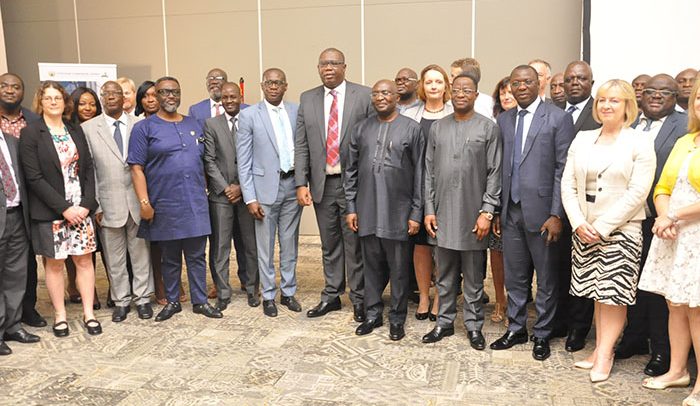Vice-President Dr. Mahamudu Bawumia (4th from right) with guests including ministers after the 11th International Upstream Forum in Accra
The Vice-President, Dr. Mahamudu Bawumia, has said government is determined to make Ghana a petroleum hub in the West Africa sub-region with the introduction of efficient and effective regulatory systems.
That, he said, was part of the reasons government was developing a robust institutional framework and legislations to ensure environmental safety, fairness, transparency and value for money in the exploitation of Ghana’s hydrocarbon resources.
The Vice-President made this known during the opening of the 11th International Upstream Forum (IUF) organised by the Petroleum Commission in Accra yesterday.
It was the first time the forum was held in Ghana and Africa in general.
Delegates from seven other countries such as Nigeria, Uganda, Mozambique, United Kingdom, USA, Canada and Norway participated in the forum.
According to him, government would continue to collaborate with international agencies to learn international best practices towards the realisation of the “Ghana Beyond Aid” agenda.
The event attracted petroleum experts, regulatory agencies and policymakers to discuss challenges facing the industry, share ideas and experiences to ensure optimum benefit for resource-rich nations.
Dr. Bawumia mentioned some legislative instruments and regulatory frameworks that had been instituted for sound and safe environmental practices and ensure good governance to attract the needed investment in the sector.
These included the Petroleum Management Act and Petroleum Exploration and Production Regulation of 2011 as well as development of Jubilee Oilfield, TEN Oilfield and Integrated Offshore Cape Three Points.
He said government also aimed at equipping the youth with relevant skills and expertise to participate in the oil and gas sector.
He added that government would adopt contemporary innovative technologies in order to derive maximum benefit for Ghana.
Besides, he disclosed some strategies government had instituted to improve monitoring and compliance of petroleum laws to ensure transparent and productive industry.
Some of the strategies included opening new areas of exploration and production, engineering the Ghana National Petroleum Corporation as a standby operator to invest in the sector, building the vocational skills of the youth to explore the oil and gas industry and promulgate a robust regulatory regime for effective governance of the industry.
The Minister for Energy, John Peter Amewu, in a remark, acknowledged that Ghana was still an emerging zone in the petroleum industry, and was ready to learn and share ideas with mature jurisdictions for sustainable utilisation of the resources.
The Chief Executive Officer of the Petroleum Commission, Egbert Failbile, welcoming participants, said the commission was poised to become a world-class regulatory body and would continue to foster strategic alliances to help build an efficient upstream sector in Ghana.
By Charles Takyi-Boadu, Presidential Correspondent

